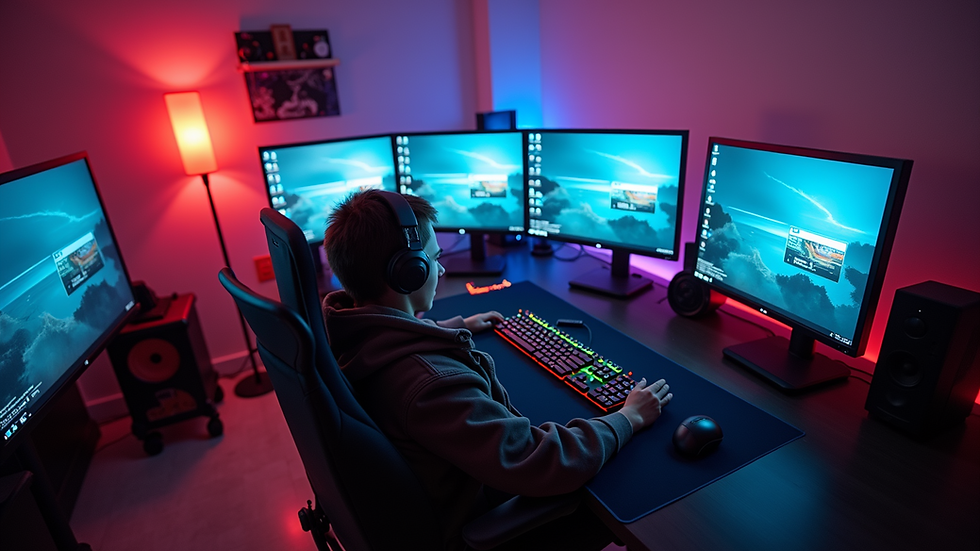The Role of Gaming Communities in Building Connections
- Ravens Gamer

- Jun 9, 2025
- 4 min read
In today’s digital world, gaming has evolved from a solitary activity into a robust social platform. The rise of online gaming communities has been instrumental in forging connections among players from around the globe. These communities are not just about gaming; they cultivate friendships, foster teamwork, and create spaces for people to share their experiences. In this blog post, we'll explore the dynamic role of gaming communities in building connections and discuss practical ways to engage with them effectively.
Understanding the Gaming Community
Gaming communities encompass a diverse array of individuals who share a passion for video games. These communities may form around specific games, genres, or even gaming platforms. From large forums and social media groups to in-game guilds and clubs, the variety is immense.
An interesting statistic from the Entertainment Software Association reveals that over 70% of gamers play with others, highlighting the social aspect of gaming. In these communities, players collaborate, compete, and generally enjoy their shared love for gaming.

The Benefits of Being part of a Gaming Community
The benefits of engaging with a gaming community are numerous. Firstly, they provide a sense of belonging. As players interact with fellow gamers, they find common interests and shared experiences, which can lead to lasting friendships.
Furthermore, gaming communities can enhance skills. Members frequently exchange tips, strategies, and advice on gameplay. This collaborative learning environment allows both new and seasoned players to improve their abilities. Plus, it often leads to better performance in competitive settings.
Lastly, these communities often organize events, tournaments, and meetups, both online and offline. This not only provides an avenue for competition but also for social interaction.
Types of Gaming Communities
There are various types of gaming communities, each with its unique flavor. Here’s a breakdown of some prominent types:
Online Game Forums: Websites like Reddit or gaming-specific forums allow players to share experiences, discuss strategies, and ask for help. These are often the go-to places for gamer discussions.
Social Media Groups: Platforms like Facebook or Discord host groups where gamers can gather. These groups are a place for members to share content, organize gaming sessions, and connect with others.
In-game Guilds and Clans: Many multiplayer games allow players to form or join guilds. These are dedicated groups of players who collaborate, often focusing on achieving specific goals within the game.
Local Gaming Events: Some communities take their interactions offline, hosting LAN parties, gaming tournaments, or conventions where players can meet face-to-face.

How to Engage Effectively with a Gaming Community
Joining a gaming community can seem daunting at first, but there are effective strategies to integrate smoothly.
Choose the Right Community: Look for a community that matches your gaming interests and style. It could be a casual group or a more competitive environment depending on what you seek.
Contribute Actively: Share your insights, experiences, and even content like game reviews or tips. Active participation will help you establish yourself within the community.
Be Respectful and Open-minded: Embrace diversity and be respectful of other players' opinions. The gaming community thrives on varied perspectives, and fostering a welcoming environment encourages deeper connections.
Participate in Events: Join online tournaments or community discussions. These activities can quickly immerse you in the community and help you meet other gamers.
Utilize Platforms like Discord: Many communities use Discord for real-time communication. Engaging in group chats or voice conversations can significantly enhance your connections with others.
Real-life Connection Through Online Gaming
While gaming is often seen as an online activity, the connections formed in these communities can lead to real-life friendships. Many gamers report attending gaming conventions and local meetups, which often turn into long-term friendships.
By leveraging platforms like ravens gaming, players can find a network of fellow enthusiasts ready to share tips, tricks, and experiences. This not only enriches the gaming experience but often transforms online relationships into meaningful offline connections.

Challenges and Solutions in Gaming Communities
Despite all the positives, gaming communities are not without their challenges. Issues such as toxicity, elitism, and harassment can create a hostile environment. Addressing these issues is vital for nurturing a healthy gaming culture.
Report Toxic Behavior: Most communities have guidelines against toxicity. Use reporting features to address unacceptable behavior.
Encourage Positive Interactions: Be a role model in the community by promoting inclusivity and support. This approach encourages others to follow suit.
Create Safe Spaces: Communities focusing on specific demographics, such as women in gaming or LGBTQ+ gamers, can offer a supportive environment that amplifies underrepresented voices.
Moderation and Community Guidelines: Strong moderation can ensure that communities remain welcoming. Community guidelines can help set expectations for behavior and promote a healthy atmosphere.
The Future of Gaming Communities
As gaming continues to evolve, so too will its communities. The increasing popularity of virtual reality (VR), augmented reality (AR), and cross-platform play is likely to enhance the social aspects of gaming even further.
Additionally, as gaming becomes more mainstream, we can expect more diverse groups to form. These new communities could provide fresh perspectives and foster greater inclusivity within the gaming landscape.
As players continue to connect, share, and grow together, gaming communities will undoubtedly play an essential role in shaping the future of how we interact through gaming.
In essence, gaming communities have transformed the way players connect and engage with each other. By understanding the dynamics of these groups and actively participating in them, individuals can foster meaningful relationships and enhance their gaming experiences. Whether you're a casual gamer or a competitive player, embracing the vibrant world of gaming communities will enrich your journey and help you build lasting connections.





Comments